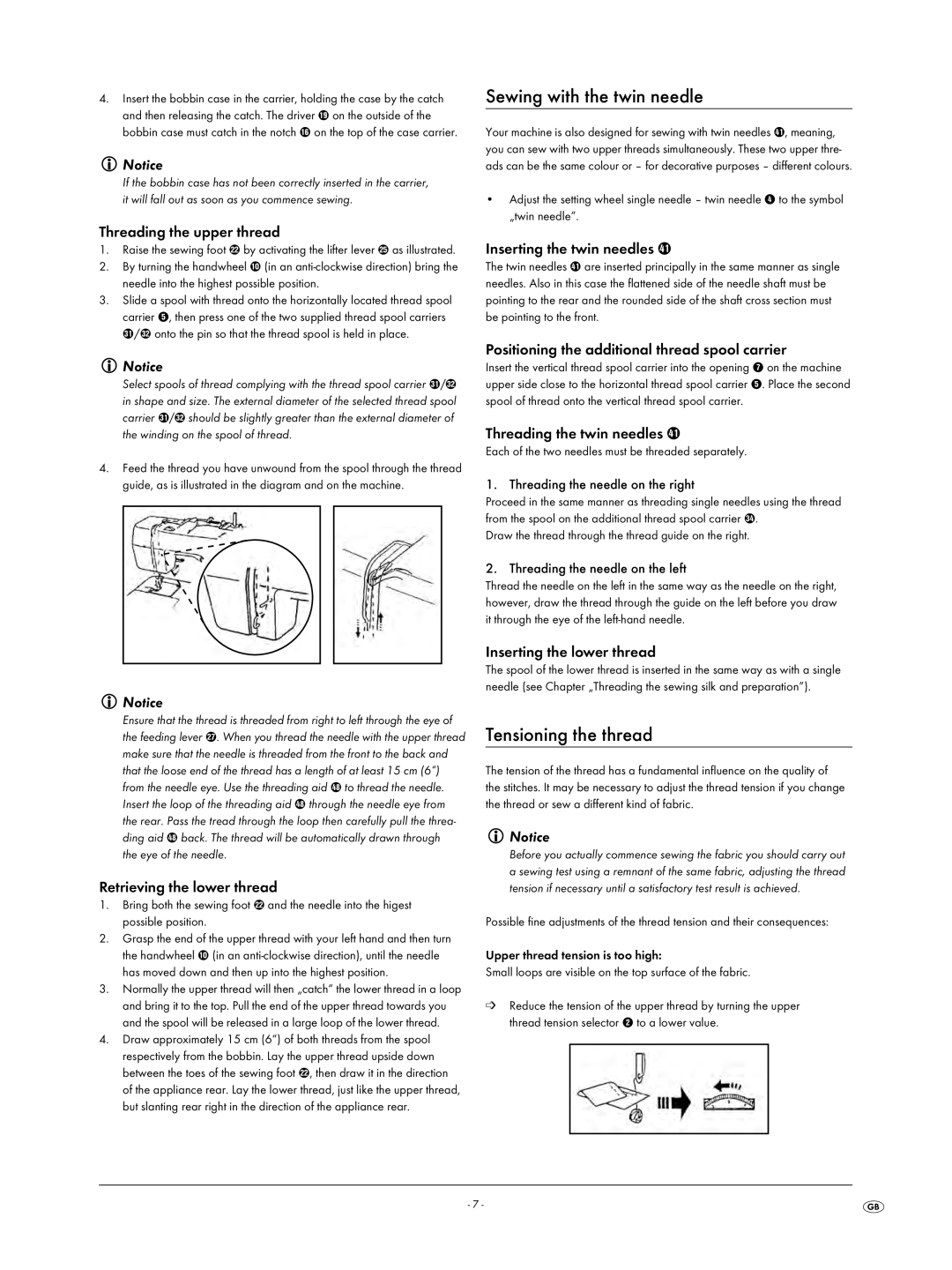
4.Insert the bobbin case in the carrier, holding the case by the catch and then releasing the catch. The driver o on the outside of the bobbin case must catch in the notch z on the top of the case carrier.
Notice
If the bobbin case has not been correctly inserted in the carrier, it will fall out as soon as you commence sewing.
Threading the upper thread
1.Raise the sewing foot s by activating the lifter lever g as illustrated.
2.By turning the handwheel 0 (in an
3.Slide a spool with thread onto the horizontally located thread spool carrier 5, then press one of the two supplied thread spool carriers x/c onto the pin so that the thread spool is held in place.
Notice
Select spools of thread complying with the thread spool carrier x/c in shape and size. The external diameter of the selected thread spool carrier x/c should be slightly greater than the external diameter of the winding on the spool of thread.
4.Feed the thread you have unwound from the spool through the thread guide, as is illustrated in the diagram and on the machine.
Notice
Ensure that the thread is threaded from right to left through the eye of the feeding lever j. When you thread the needle with the upper thread make sure that the needle is threaded from the front to the back and that the loose end of the thread has a length of at least 15 cm (6“) from the needle eye. Use the threading aid G to thread the needle. Insert the loop of the threading aid G through the needle eye from the rear. Pass the tread through the loop then carefully pull the threa- ding aid G back. The thread will be automatically drawn through
the eye of the needle.
Retrieving the lower thread
1.Bring both the sewing foot s and the needle into the higest possible position.
2.Grasp the end of the upper thread with your left hand and then turn the handwheel 0 (in an
3.Normally the upper thread will then „catch“ the lower thread in a loop and bring it to the top. Pull the end of the upper thread towards you and the spool will be released in a large loop of the lower thread.
4.Draw approximately 15 cm (6“) of both threads from the spool respectively from the bobbin. Lay the upper thread upside down between the toes of the sewing foot s, then draw it in the direction of the appliance rear. Lay the lower thread, just like the upper thread, but slanting rear right in the direction of the appliance rear.
Sewing with the twin needle
Your machine is also designed for sewing with twin needles C, meaning, you can sew with two upper threads simultaneously. These two upper thre- ads can be the same colour or – for decorative purposes – different colours.
•Adjust the setting wheel single needle – twin needle 4 to the symbol „twin needle”.
Inserting the twin needles C
The twin needles C are inserted principally in the same manner as single needles. Also in this case the flattened side of the needle shaft must be pointing to the rear and the rounded side of the shaft cross section must be pointing to the front.
Positioning the additional thread spool carrier
Insert the vertical thread spool carrier into the opening 7 on the machine upper side close to the horizontal thread spool carrier 5. Place the second spool of thread onto the vertical thread spool carrier.
Threading the twin needles C
Each of the two needles must be threaded separately.
1. Threading the needle on the right
Proceed in the same manner as threading single needles using the thread from the spool on the additional thread spool carrier b.
Draw the thread through the thread guide on the right.
2. Threading the needle on the left
Thread the needle on the left in the same way as the needle on the right, however, draw the thread through the guide on the left before you draw it through the eye of the
Inserting the lower thread
The spool of the lower thread is inserted in the same way as with a single needle (see Chapter „Threading the sewing silk and preparation”).
Tensioning the thread
The tension of the thread has a fundamental influence on the quality of the stitches. It may be necessary to adjust the thread tension if you change the thread or sew a different kind of fabric.
Notice
Before you actually commence sewing the fabric you should carry out a sewing test using a remnant of the same fabric, adjusting the thread tension if necessary until a satisfactory test result is achieved.
Possible fine adjustments of the thread tension and their consequences:
Upper thread tension is too high:
Small loops are visible on the top surface of the fabric.
➩Reduce the tension of the upper thread by turning the upper thread tension selector 2 to a lower value.
- 7 -
